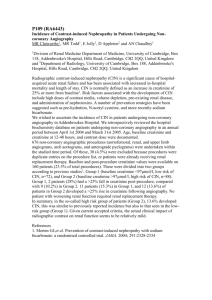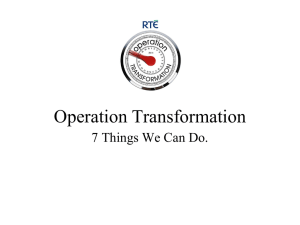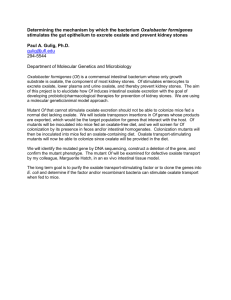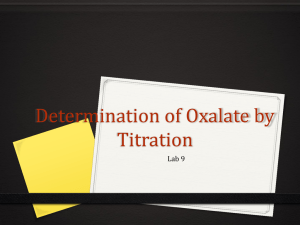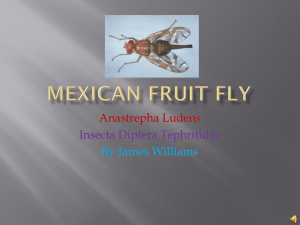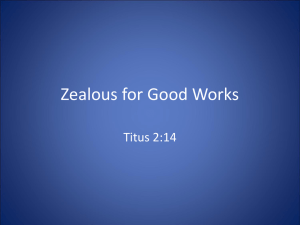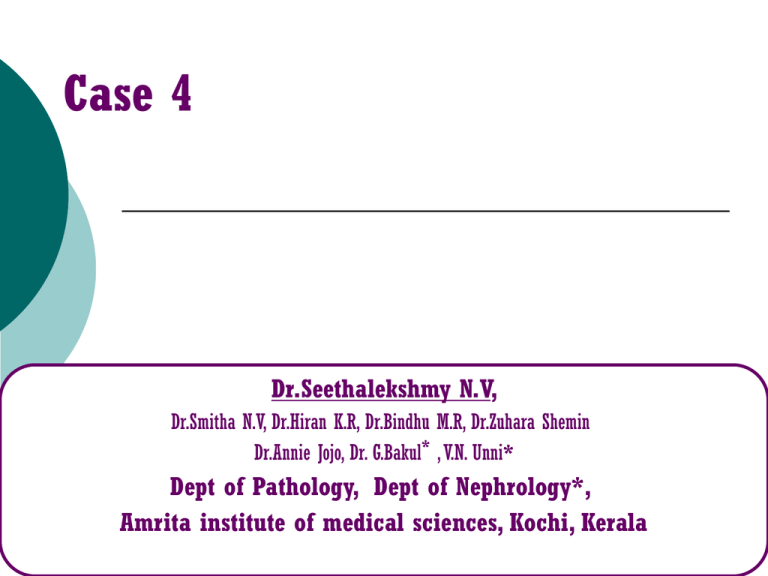
Case 4
Dr.Seethalekshmy N.V,
Dr.Smitha N.V, Dr.Hiran K.R, Dr.Bindhu M.R, Dr.Zuhara Shemin
Dr.Annie Jojo, Dr. G.Bakul* , V.N. Unni*
Dept of Pathology, Dept of Nephrology*,
Amrita institute of medical sciences, Kochi, Kerala
Case history
38 yr gentleman
Routine health checkup – WNL
except for hypercholesterolemia
Vague abdominal discomfort, nausea,
loss of appetite – 4 days later
No fever / jaundice
Bowel habits - normal
Normal urine output
O/E – conscious, oriented
BP – 130/82 mm of Hg
Systemic exam – WNL
Investigations
Blood routine – Normal
LFT – normal
S. Creatinine – 6.4mg/dl
Urine routine – albumin – nil , sugar - nil
no RBCs / casts, oxalate crystals++
Clinical diagnosis
ACUTE RENAL FAILURE
2 sessions of dialysis
Left Percutaneous Kidney biopsy
Renal biopsy
H&E
H&E
H&E x 400
H&E
Von kossa
Under polarisation
Immunofluorescence study
Negative for IgG, IgA, IgM, C3 , C1q , and
both Kappa and lambda light chains
EM- not done
Diagnosis
Renal biopsy:
Acute oxalate nephropathy
Secondary Hyperoxaluria…. ???
On detailed evaluation
He had……………
Fresh concentrated “Irumban puli
(Averrhoa bilimbi) ” juice
Approximately 50 fruits
In empty stomach
4 days
(For hypercholesterolemia)
Averrhoa bilimbi- literature
Bilimbi
Irumban Puli
Chemmeen Puli
bimbul
Fruit-bearing tree
-Genus- Averrhoa
-Family - Oxalidaceae.
Star fruit (A.carambola )
is another member of
this family
Star fruit
(Averrhoa carambola)
American Journal of Kidney
Diseases, Volume 57, Issue 4,
April 2011, Pages A23-A25
“Oxalidaceae”-High levels of oxalic
acid, extremely low pH (0.9-1.5).
The oxalate content of the “Irumban
puli” fruit was estimated in our lab
Fruit
Oxalate content
(mg/100gm)
Cranberry
1.1
Grape
1.6
Tomato
5.5
Pineapple
7.3
Orange
2.2
Apple
0.5
Banana
Irumban puli
(A.Bilimbi)
3.2
25.1
Follow up
Hemodialysis for 10 days
Symptomatic improvement - 1 week
RFT improved
Follow up
-S.Creat at 6 weeks is 1.2
We present
Retrospective study
24 patients
11 hospitals in the State of Kerala
Study period – 2010-2013
ARF after intake of Irumban puli fruit
juice prior to onset of symptoms
Parameters analysed
Age , sex
Symptoms, comorbidities
BP
USG- kidney, urine R/E
Serum creatinine levels
Quantity of fruit juice consumed
Time for recovery
Detailed histology
Follow up
ANALYSIS
Age wise
AGE WISE DISTRIBUTION
6
5
4
No.of patients 3
2
1
0
<20
21-30 31-40 41-50 51-60 60-70
AGE
>70
Co- morbidities
Comorbidities
10
8
6
No.of patients
4
Series1
2
0
DM
HTN
DLP
Comorbidity
Nil
S. Creatinine
Range of Highest S. Creatinine
20
15
No.of Patients 10
No.of patients
5
0
<3
3_5
S. Creatinine
>5
No.of patients with hemodialysis and kidney biopsy
42%
58%
Yes
no
4
14
1
1
4
KERALA
Distribution of cases
Results
All 15 patients on renal biopsy Acute oxalate nephropathy .
USG – normal
Taken for
Hyperlipidemia, HTN
20 – 100 Nos
100 - 400ml /day
Fresh concentrated juice or wine
In empty stomach
Follow up
14 patients on Hemodialysis
recovered.
Creatinine normalized in 2-6
weeks.
1 expired due to cardiac event
8 patients who were managed
conservatively - good response
Conclusions
Irumban Puli (Averrhoa bilimbi) , in
excess quantities , can cause Acute
oxalate nephropathy
With the experience gained ,we can
adopt supportive management , in
patients with this specific history, in
the absence of other co-morbid
conditions
This is the first report of toxicity with
A. bilimbi
Take home message
Any drug- Dosage is important
The use of alternative remedies are
common
Consider it in the differential diagnosis of
unexplained renal injury
Team work led to identification of cause
Indian Journal Of Nephrology ,July 2013/Vol 23/Issue 4
Acknowledgement
The Dept of Nephrology –
Dr. Anil Mathew (AIMS Kochi),
Dr. P.M. Jayaraj (Mother Hospital Thrissur),
Dr. Kishore S Dharan (MOSC Medical College , Kolenchery),
Dr. P.P. Jose (Lissie Hospital , Kochi),
Dr. Jayakumar,Dept of Nephrology,(Govt.Medical College ,
Kottayam )
Dr. R. Rajesh (St. Gregorius Medical Misssion Hospital, Parumala )
Dr. Manju Thampi (NIMS , Trivandrum) .
Dr. Geetha M Nair ( PRS hospital, Trivandrum )
Dr. Arun C (Govt. Medical College, Trichur)
Dr. Binu Upendran (Lourde’s Hospital, Kochi)
Dr. Jacob George (Govt. Medical College, Trivandrum )
Dr .T.T Paul( West fort hospital ,Thrissur)
Dr. Kasi Vishweswaran (Benziger hospital, Kollam)
&
Dr. Kannan Vaidyanathan, Dept of Biochemistry, AIMS
for their whole hearted support for this study.
References
1.
2.
3.
4.
5.
Williams HE, Wandzilak TR. Oxalate synthesis, transport and the
hyperoxaluric syndromes. J Urol 1989;141:742-7.
Chen CL, Fang HC, Chou KJ, Wang JS, Chung HM. Acute oxalate
nephropathy after ingestion of star fruit. Am J Kidney Dis
2001;37:418-22.
Niticharoenpong K, Chalermsanyakorn P, Panvichian R, Kitiyakara
C. Acute deterioration of renal function induced by star fruit
ingestion in a patient with chronic kidney disease. J Nephrol
2006;19:682-6
Ambili S, Subramoniam A, Nagarajan NS. Studies on the
antihyperlipidemic properties of Averrhoa bilimbi fruit in rats.
Planta Med 2009;75:55-8.
Neto MM, da Costa JA, Garcia-Cairasco N, Netto JC, Nakagawa B,
Dantas M. Intoxication by star fruit (Averrhoa carambola) in 32
uraemic patients: Treatment and outcome. Nephrol Dial
Transplant 2003;18:120-5.
Thank you



